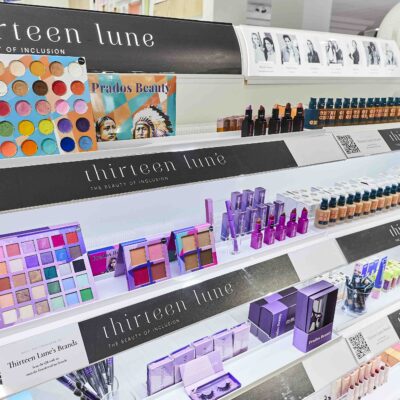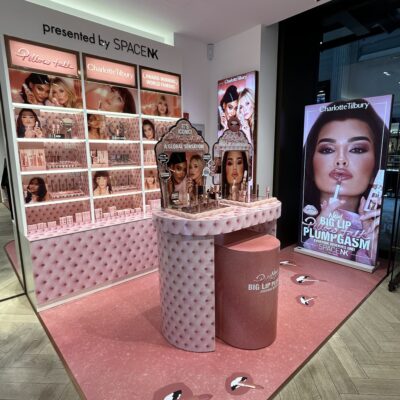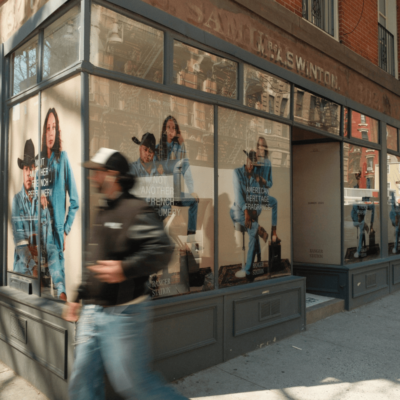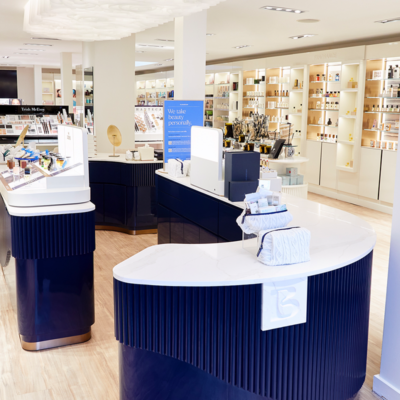
10 Canadian Beauty Brands Reflect On Hudson’s Bay And The Significance Of Its Closure
Hudson’s Bay, the storied Canadian department store retailer often referred to as “The Bay,” is closing by June 15 after 350-plus years in operation, prompting sadness and frustration from homegrown beauty brands that looked to it as a champion of indie beauty.
Owned by HBC, the parent company of Saks Global in the United States, Hudson’s Bay’s business came crashing down in March when it initiated restructuring proceedings under the Companies’ Creditors Arrangement Act (CCAA), a Canadian process similar to filing for Chapter 11 bankruptcy protection in the U.S. Citing the impacts of new global tariffs, post-pandemic consumer behavior shifts and weakened discretionary spending, the liquidation spells the end of 80 Hudson’s Bay locations and its e-commerce website along with three Saks Fifth Avenue and 13 Saks Off 5th locations it runs through a licensing agreement.
Hudson’s Bay’s downfall doesn’t directly affect Saks Global, which encompasses Saks Fifth Avenue, Saks Off 5th, Neiman Marcus and Bergdorf Goodman since HBC purchased Neiman Marcus Group for $2.65 billion last year, however, the sister companies are contending with similar challenges. Both Hudson’s Bay and Saks Global have struggled to pay vendors over the last two years as they face shrinking market share and economic uncertainty.
Beauty Independent reached out to 10 Canadian beauty brands to share their memories of Hudson’s Bay and understand how its closure could roil the Canadian beauty retail landscape, particularly for emerging brands.
Mia Fiona Kut
Founder and CEO, Luna Nectar
“Hudson’s Bay was one of the first major retailers to believe in our brand. Being stocked there gave us national visibility and credibility. It was a milestone moment and allowed us to expand into many other retailers. The gap left by Hudson’s Bay has thankfully been filled by our Canadian distributor.
However, for many of us in CPG, Hudson’s Bay was one of the few places where indie Canadian brands could sit alongside global giants. Its closure means the loss of a platform for Canadian innovation, storytelling and retail identity. It leaves a noticeable void in the ecosystem for emerging brands trying to grow within our own country.”
David Gaylord
CEO, Bushbalm
“If you were a small CPG brand counting on sales growth from Hudson’s Bay, you were heading down a risky road. The recent developments matter in only two key areas, and neither significantly impacts emerging Canadian beauty brands.
- Prestige beauty and conglomerates—This change will hit the major players like Estée Lauder and L’Oréal the hardest. It takes a meaningful bite out of their P&Ls, forcing them to recover that lost revenue elsewhere.
- Nostalgia—Hudson’s Bay carries sentimental value for many. It might have been someone’s first job or a cherished childhood shopping destination. While that’s meaningful, nostalgia alone can’t sustain a business model that’s no longer viable.
At one time, Hudson’s Bay represented the best of Canadian craftsmanship, national pride and premium goods. Unfortunately, that identity has eroded. While it’s a shame to see this decline, I don’t believe it hinders the future of Canada’s up-and-coming beauty brands. Opportunity is everywhere—and we’ll continue to find it.”
Jenn Harper
Founder and CEO, Cheekbone Beauty
“Hudson’s Bay was the first place I ever bought makeup. I was 18 years old, and I still remember how proud I felt purchasing my first expensive product from the beauty counter. It felt like a rite of passage.
But now, as I am in the middle of ‘The Knowing’ by Tanya Talaga, that memory carries more weight. I’m reminded of the complicated and painful history behind the Hudson’s Bay Company and its role in colonization. It’s a full-circle moment, thinking about how far we’ve come, how much we still carry and why Indigenous representation in beauty and business matters more than ever.”

Greg Macdonald
Founder and CEO, Bathorium
“When I founded Bathorium in 2014, one of my dreams was to see our products carried in the iconic Hudson’s Bay stores across Canada. For years, we pitched to their buying team, chasing every opportunity to get in front of them. In 2018, we finally launched with HBC both in-store and online. I was elated. We had made it.
During the pandemic, as retail shifted rapidly, HBC adapted quickly, offering local pickup zones and expedited shipping at a time when spas and boutiques carrying Bathorium were closed. It was a strong partnership. As the world reopened, we co-invested with HBC in their standalone beauty towers, brand activations and online gift-with-purchase programs. For a while, they truly felt like a valuable retail partner.
But in spring 2023, things started to shift. Invoices that were previously paid on our standard net-60 terms began stretching to 120 to 150 days. By that holiday season, HBC owed Bathorium over $25,000. They proposed a 20% discount in exchange for immediate payment of the outstanding balance, assuring us it was a one-time solution to help them regain footing post-pandemic. Out of good faith, we agreed.
In early 2024, orders from HBC ramped up again, a signal we took as renewed growth, but, behind the scenes, payments stopped altogether. Over $40,000 worth of product was shipped in the first two quarters alone, yet not a single invoice was paid. We paused all new orders and escalated the issue repeatedly, eventually involving their CFO, Jennifer Bewley. Despite countless apologies and assurances, no payment ever came.
Now, in May 2025, Bathorium, like many other small brands, is still unpaid. We don’t have the legal resources to pursue HBC as they navigate bankruptcy proceedings. Instead of honoring their debts to loyal Canadian vendors, they chose to prioritize upfront purchases from multinational partners like Cuisinart and Dyson.
My heart goes out to the frontline HBC retail staff. I hope they find new roles with companies that treat both customers and partners with integrity. We’re proud to be working with retailers like Holt Renfrew and Nordstrom, who operate with transparency and respect. As for HBC, good riddance.”
Helen Yin
Founder, Inoki Bathhouse
“Growing up, Hudson’s Bay was a place of aspiration and discovery, an iconic Canadian institution where you could discover countless beauty, fashion and lifestyle brands. It was also one of the earliest department stores to provide a platform for indie brands. Its closure marks more than just the loss of a retailer, it signifies the end of a cultural touchpoint that shaped how many Canadians shop.
We’ve watched major department stores like Target, Nordstrom and now Hudson’s Bay struggle in the Canadian retail landscape. In contrast, we’re seeing community-driven, experiential spaces like Stackt Market and The Well thrive. I believe the future of retail in Canada isn’t in mass scale, it’s in curation, experience and authentic connection.
When Inoki Bathhouse launched our summer pop-up at Stackt Market, we knew we couldn’t rely on foot traffic alone. We had to create something memorable. So, we transformed the space to feel, sound, smell and look like a serene tea bath apothecary where visitors were invited to hand-blend their own bathing rituals using fresh flowers, teas, and botanicals. The space was designed to awaken the senses and slow the pace, offering a moment of calm and connection in the middle of the city.
In just three short weeks, we educated over a thousand people on the benefits of bathing in tea, generated over five figures in revenue and sparked dozens of pieces of organic social media coverage. It proved that today’s consumers aren’t just looking for products. They want to connect with the products they’re purchasing.
It’s been eye-opening to travel and see how other countries approach retail. For example, in Korea, I witnessed how technology and design came together to create show-stopping activations and shopping experiences such as a massive kinetic flower installation and a rotating hand-bag conveyor belt making you feel like you were literally picking up an item from the runway. While walking through a shopping district, I never felt bored. There was always something to see, experience, touch, sample, or eat.
For Canadian brands, Hudson’s Bay’s exit reinforces the importance of not taking foot traffic for granted, to meet customers in meaningful ways and to build businesses that go beyond the shelf.”
Amanda Schuler
Founder, Ember Wellness
“The closing of HBC is truly the end of an era. I have memories of being younger and going to the Room, the women’s designer clothing department, to just touch and admire the gorgeous clothing and fixture design. Coming from the furniture industry and from textile design, I’ve been obsessed with their multi-stripe heritage point blanket for many years. It’s a piece I’ve owned several times over, have gifted friends over the years for weddings and special occasions and have even upholstered with the precious wool blanket.
The Hudson’s Bay Company and its heritage meets modern aesthetic was amazing. I always admired it and was a consumer. It’s a shame that at some point years passed, and it failed to innovate. I personally wish they doubled down on the heritage feel. Even all that prime real estate couldn’t save them.
We’ve been in business for almost four years and, believe it or not, we’ve never had The Bay on our target account list. Between rumors of unpaid bills and store visits that sometimes revealed neglected beauty sections, we decided not to approach their beauty buyers.”
Graydon Moffat
Founder and CEO, Graydon Skincare
“Hudson’s Bay wasn’t just a department store. It was a symbol of Canadian identity, of heritage retail and, for many entrepreneurs like me, of what it meant to have ‘made it’ as a brand in this country. Landing a retail partnership with The Bay and seeing my products on the shelves of their iconic Yonge Street location was a milestone for me as a founder and entrepreneur.
But the prestige of being stocked in such a storied institution didn’t translate into hugely meaningful sales. What it did offer was credibility—something that helped build trust with our online community. So, when The Bay asked to include our Supermoon Serum in their 2024 Beauty Advent Calendar, I said yes. It felt like a safe, strategic partnership. I never imagined we’d end up as one of the many small brands now counted among their creditors.
Watching The Bay struggle to survive has been heartbreaking. Not just because my company, like many others, has been left financially impacted by the collapse, but because it represents the unravelling of a retail ecosystem that once helped small Canadian businesses thrive. Department stores like the Bay offered more than shelf space. They offered a sense of legitimacy, access to customers who valued Canadian-made products, and, for many of us, a way to scale thoughtfully within our own borders.
The only way to go from here is forward. What’s happening with The Bay is out of my hands. Instead, I’m choosing to focus on the things I can control: strengthening and shortening our supply chain, investing in sustainable innovation, refining our brand identity and building deeper relationships with our customers, community and investing in meaningful reciprocal relationships with responsible retail partners whom we trust.
If the fall of a 354-year-old institution has taught us anything, it’s that the future of Canadian business won’t be built by legacy. It will be built by those of us still here, still building and still believing in the power of local, sustainable, independent brands.”

Bunny Ghatrora
Co-founder, Blume
“The Bay was a landmark in so many of our lives, especially when it came to discovering beauty. For many of us, it was the first place we experienced prestige beauty in person, standing at the iconic cosmetic counters, getting our first fragrance or nervously asking for a foundation match. There’s something really nostalgic about those moments.
The store wasn’t just a retailer, it was a cultural fixture. Whether it was buying towels for your first apartment, your first “grown-up” lipstick or walking through the fragrance aisles with your mom or creating our bridal registry, The Bay played a meaningful role in shaping our core consumer memories.
As a Canadian-founded brand, it’s always sad to see a business with such longevity and impact close its doors. It raises bigger questions about the future of legacy retail in Canada and what it means for emerging brands trying to carve out space in a rapidly changing landscape. There’s many small/independent brands that worked closely with The Bay and now have to find alternative distribution.
But one thing that hasn’t changed is Canadians’ love for beauty. We’re still deeply curious, intentional and emotionally connected to the brands we support. How and where we discover those brands may be evolving, but the desire to engage with beauty in a meaningful way remains as strong as ever.”
Laura Thompson
Co-founder, Three Ships Beauty
“Hudson’s Bay holds nostalgic memories for so many Canadians. I remember moving into my university dorm and going there to buy everything I needed to start living on my own. When Connie [Lo] and I launched Three Ships, Hudson’s Bay was a dream retailer for us. Landing them in 2020 felt like a ‘we made it’ moment and seeing our products on their shelves was incredibly exciting. They were one of the few retailers truly willing to support young, indie brands and being carried there gave us a real sense of pride in our early days.
It’s been sad to witness their decline, the disarray of the stores and how vendors have been treated as the company struggled. Canada is a challenging retail environment—even Nordstrom couldn’t make it work here—and Hudson’s Bay’s closure leaves a real gap in the department store space. They will be missed.”
Lisa Karandat
Co-founder, Good Juju
“It is very sad to see The Bay closing. For almost all Canadians, The Bay has been a mainstay and integral part of Canadian culture for our entire lives. I am sure if emotion could keep a business running, it would be saved.
The reality though is this is yet another sobering reminder of the challenges facing the retail and CPG landscape today. The need to stay modern and to be ever flexible in your offerings and operations. To manage cash flow responsibly while also competing for the consumers’ attention for every business, large and small.
We are in such a turbulent environment that the need to stay nimble is one of the greatest assets you can possess, and it is not surprising that for large organizations like The Bay, the task proved too great.”





Leave a Reply
You must be logged in to post a comment.